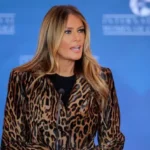As parents we all have a responsibility to do right by our children. Of course, sometimes ‘right’ can be subjective – what certain parents deem okay others will actively avoid.
In any case, I think most parents would be of the opinion that pushing your little one into the spotlight at an extremely young age might not ultimately be for the best.
That said, sometimes it’s unavoidable. Sometimes children are born with certain gifts or unique looks that make drawing the attention of others inevitable.
Young model Aira Marie was one such baby. According to reports, she became a person of interest for the modeling industry when she was just two years old…
Though all babies are born equally beautiful in our eyes, no one can deny that Aira wasn’t blessed with a rather unique appearance.
Put simply, so flawless was her skin, so cute her features, that she looked like a doll. Her parents knew that their daughter stood out from the crowd, too, so they took her to a modeling agency very early on.
Before long, photos of Aira had gone viral online, and though people agreed that she was a true beauty, there were those who convinced themselves that the girls’ parents had edited the images, thereby filtering their baby’s appearance.
Eventually, however, it became apparent that Aira’s doll-like look wasn’t the result of some clever Photoshop trick, but rather simply how she looked in real life.
Needless to say, the young girl’s life quickly became one of modeling agencies, photoshoots and studios. So much so that she barely had the time to experience a normal childhood.
As per reports, Aira young life was dictated by her parents, who firmly believed that their little girl was on the path to stardom.
Yet as the years passed, Aira’s look changed, and the doll-like aspect that made her so unique began to fade. Sadly, interest from modeling agencies waned, and invites to shows and studio shoots slowed almost to a complete halt.
These days, Aira’s a teenager, and she updates her social media channels with new content for her followers. Her Facebook page, for example, boasts some 12,000 fans.
See how looks today below:
View this post on Instagram










